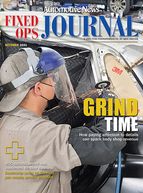Shoppers are willing to buy a new vehicle close enough to what they want in today's tight inventory market or select something in the pipeline and wait for it, Jackson said. Others will switch to used vehicles or say they will wait until next year. Jackson views that as building "pent-up demand."
Stephens Inc. analyst Rick Nelson said in a note to investors last week that inventory levels likely won't improve immediately when vehicle production increases. The reasons are overall high consumer demand and that much of the incremental production will go to buyers who already have ordered vehicles.
"We don't believe that inventory will materially improve until well into 2022," Nelson wrote. "As a result we see outsized new vehicle margins over the coming quarters."
How AutoNation's inventory situation plays out in the fourth quarter and next year will be on Manley's watch.
Manley also will lead AutoNation's capital allocation strategy, which has included expanding the retailer's platform of AutoNation USA used vehicle-only stores, buying back shares and returning to dealership acquisitions.
Last week, AutoNation said it had signed an agreement to buy Priority 1 Automotive Group of Towson, Md., pending automaker and other approvals. The acquisition, which covers nine luxury dealerships and three collision centers, is expected to generate about $420 million in annual revenue. A closing date is slated for November.
In late September, AutoNation purchased 11 dealerships and a collision center from Peacock Automotive Group in a deal originally announced in April. Those stores are expected to generate $380 million in annual revenue.
The deals were the first acquisitions for AutoNation after being on the sidelines of the buy-sell market since 2018.
"We will continue to look for additional acquisitions that complement our portfolio and meet our return thresholds," AutoNation CFO Joe Lower told analysts last week.
From Sept. 30, 2020, to Sept. 30, 2021, AutoNation spent $2.2 billion to buy back 27 percent of its outstanding shares of stock. During the third quarter alone, AutoNation spent $879 million to repurchase nearly 11 percent of its own shares.
The company's board of directors has authorized spending an additional $1.3 billion on stock repurchases.
Jackson has largely favored stock buybacks over paying what he has described as high prices to acquire dealerships.
And some analysts see that strategy continuing.
Truist Securities analyst Stephanie Moore, in a note to investors last week, said that with AutoNation's $1.8 billion in liquidity, "we expect share repurchases to serve as a main part of its capital allocation strategy."







